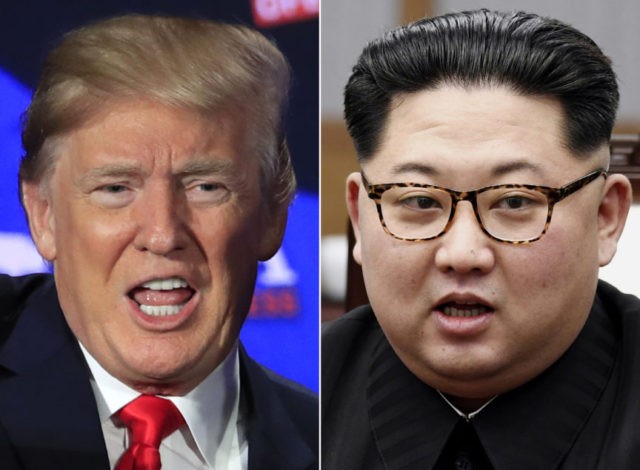Reports on Monday revealed that North Korean officials sent a letter to Secretary of State Mike Pompeo warning that denuclearization talks “may fall apart” because the United States will not “meet expectations in terms of taking a step forward to sign a peace treaty” shortly before his trip to the country was canceled.
The letter was delivered to Pompeo on Friday, shortly before he was scheduled to depart on his fourth trip to North Korea, but was not reported until Monday. According to the Washington Post, the letter is the primary reason Pompeo’s trip was abruptly canceled by President Donald Trump:
Pompeo received the letter from Kim Yong-chol, vice chairman of North Korea’s ruling Workers’ Party Central Committee, on Friday morning, and showed it to Trump in the White House, two senior administration officials confirmed. The exact contents of the message are unclear, but it was sufficiently belligerent that Trump and Pompeo decided to call off Pompeo’s journey, where he was set to introduce his newly announced special envoy, Stephen Biegun, to his North Korean counterparts.
White House Press Secretary Sarah Huckabee Sanders told CNN that Pompeo was in the room Friday afternoon when Trump tweeted he was canceling Pompeo’s trip because Trump felt “we are not making sufficient progress with respect to the denuclearization of the Korean Peninsula.” Reporters also spotted Andrew Kim, a top CIA Asia official who has traveled with Pompeo to Pyongyang, heading into the West Wing on Friday.
The Post reported that letters from North Korea have been delivered to the United States through the “New York Channel” of North Korea’s mission to the United Nations. Pompeo has also carried some letters back and forth between Trump and North Korean dictator Kim Jong-un.
While the other “belligerent” statements in the letter have not been disclosed, the “peace treaty” referred to by Kim Yong-chol would constitute the formal conclusion of the Korean War, which was suspended with an armistice in 1953.
Such a peace treaty could represent a significant diplomatic achievement, but only if it was concluded on the right terms. The Trump White House believes North Korea wants a treaty to boost its international prestige, bolster its argument for removing American military forces from the Korean Peninsula, and weaken the sanctions regime against it.
According to the Washington Post, both Secretary of Defense Jim Mattis and National Security Adviser John Bolton are strongly opposed to signing a peace treaty before North Korea makes an irreversible and verifiable commitment to denuclearization. Bolton believes granting any further concessions to North Korea without denuclearization would be interpreted by Pyongyang as a sign of weakening American resolve.
On the other hand, the Post relayed concerns from senior U.S. officials that South Korean President Moon Jae-in remains fully committed to his diplomatic opening to North Korea and could forge ahead with further concessions and joint projects despite American reluctance.
“We have a big problem coming with South Korea. It has reached the point where the South Koreans are determined to press ahead. They no longer feel the need to act in parallel with us,” one official said.
A spokesman for President Moon confirmed to Reuters on Monday that his government sees talks between Washington and Pyongyang as “stalemated,” so there is “an even bigger need for an inter-Korea summit.” A new summit meeting between Moon and Kim Jong-un could be held in September.
An unidentified source gave CNN a nugget of hope on Tuesday by saying Pompeo is primarily using a “backdoor channel” to communicate with North Korea, which could mean the belligerent letter is a sign of stress within the North Korean power structure or a test to see how serious the Trump administration is about maintaining sanctions until denuclearization is achieved.
On the other hand, another source told CNN the letter from North Korea prompted Trump to cancel Pompeo’s trip only about ten minutes after the State Department briefed allied nations on the secretary’s agenda, which would indicate something a good deal more belligerent than demands for a peace treaty was contained in the letter.

COMMENTS
Please let us know if you're having issues with commenting.